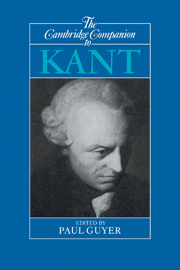Book contents
- Frontmatter
- Introduction
- 1 Kant's intellectual development
- 2 The Transcendental Aesthetic
- 3 Functions of thought and the synthesis of intuitions
- 4 The transcendental deduction of the categories
- 5 Causal laws and the foundations of natural science
- 6 Empirical, rational, and transcendental psychology
- 7 Reason and the practice of science
- 8 The critique of metaphysics
- 9 Vindicating reason
- 10 Autonomy, obligation, and virtue
- 11 Politics, freedom, and order
- 12 Taste, sublimity, and genius
- 13 Rational theology, moral faith, and religion
- 14 The first twenty years of critique
- Bibliography
- Index
9 - Vindicating reason
Published online by Cambridge University Press: 28 May 2006
- Frontmatter
- Introduction
- 1 Kant's intellectual development
- 2 The Transcendental Aesthetic
- 3 Functions of thought and the synthesis of intuitions
- 4 The transcendental deduction of the categories
- 5 Causal laws and the foundations of natural science
- 6 Empirical, rational, and transcendental psychology
- 7 Reason and the practice of science
- 8 The critique of metaphysics
- 9 Vindicating reason
- 10 Autonomy, obligation, and virtue
- 11 Politics, freedom, and order
- 12 Taste, sublimity, and genius
- 13 Rational theology, moral faith, and religion
- 14 The first twenty years of critique
- Bibliography
- Index
Summary
THE CRITIQUE OF REASON
Whatever else a critique of reason attempts, it must surely criticize reason. Further, if it is not to point toward nihilism, a critique of reason cannot have only a negative or destructive outcome, but must vindicate at least some standards or principles as authorities on which thinking and doing may rely, and by which they may (in part) be judged. Critics of “the Enlightenment project” from Pascal to Horkheimer to contemporary communitarians and postmodernists, detect its Achilles' heel in arrant failure to vindicate the supposed standards of reason that are so confidently used to criticize, attack, and destroy other authorities, including church, state, and tradition. If the authority of reason is bogus, why should such reasoned criticism have any weight?
Suspicions about reason can be put innumerable ways. However, one battery of criticisms is particularly threatening, because it targets the very possibility of devising anything that could count as a vindication of reason. This line of attack is sometimes formulated as a trilemma. Any supposed vindication of the principles of reason would have to establish the authority of certain fundamental constraints on thinking or acting. However, this could only be done in one of three ways. A supposed vindication could appeal to the presumed principles of reason that it aims to vindicate - but would then be circular, so fail as vindication. Alternatively, it might be based on other starting points - but then the supposed principles of reason would lack reasoned vindication, so could not themselves bequeath unblemished pedigrees.
- Type
- Chapter
- Information
- The Cambridge Companion to Kant , pp. 280 - 308Publisher: Cambridge University PressPrint publication year: 1992
- 61
- Cited by

